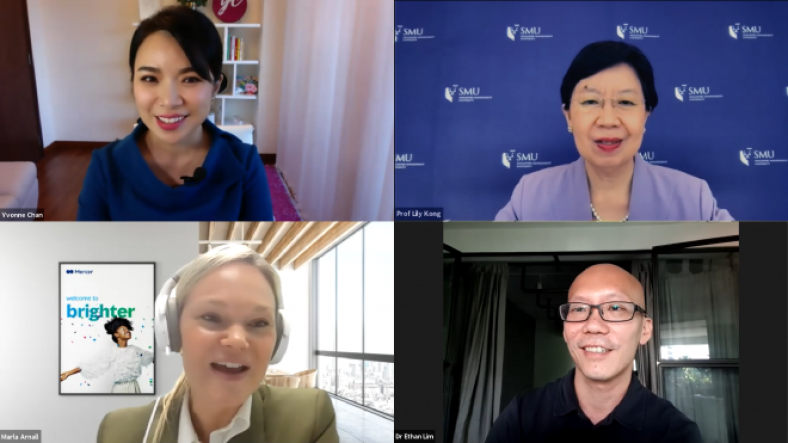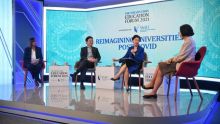
From the closure of workplace premises during the Circuit Breaker and adoption of work-from-home and split teams arrangements in 2020, to 75 per cent of employees returning to the workplace in April 2021, before reverting to working from home as a default arrangement just over a month later, it’s been a rollercoaster ride for organisations and employees during the pandemic.
What then is the importance of upskilling during a global workplace revolution, and how can universities step up in transitioning organisations and workers to the new normal of hybrid work? SMU President Professor Lily Kong was joined by international experts in a recent South China Morning Post panel session tackling the complexities of hybrid work, to discuss these issues.

For a start, the pandemic has accelerated digital adoption at the workplace and companies have engaged in some form of hybrid work since its onset, which combines remote work and face time in the office for the long term as part of their business transformation. As such, universities are now tasked with preparing students for the real world in terms of knowledge and technical competencies, as well as the realities of hybrid work.
Core competencies
Prof Kong emphasised that the University’s core curriculum — which consists of 12 required course units that include a credit-bearing community service and internship component, will remain in place regardless of disruptions by the pandemic. However, the courses will evolve to impart skills relevant to the new work climate.
“We will need to embed digital competence far more than we have had before, and we are introducing more courses on digital technology, digital transformation, and understanding the impact of digital change on human individuals,” noted Prof Kong.
SMU will also be introducing new interdisciplinary courses. For example, Digital Business, Cyber Risks and Financial Forensics, Smart Cities Management, and Computing and Law are additions to ramp up the school’s commitment to equipping students with digital transformation tools. Furthermore, classes have evolved with students working on group projects to learn how to use new digital tools like Microsoft Teams for discussions, or Slack and Trello for collaboration.
And as much as digital learning has been at the forefront of education in recent years, Prof Kong also reminds us of the importance of co-curricular activities.
“As we all work in a home environment, there sometimes is a lack of clarity as to when it's work time and when it's downtime,” says Prof Kong.
“We're all facing that and how do we prepare our students for the next pandemic, when they're going to end up working like that, where they have to learn to manage their time, manage competing demands.”
SMU has rolled out workshops to enable students to work within such constraints, and new cross border internships and projects with students from other jurisdictions, to “create new environments for them to learn cross-cultural interactions”.
“And through all of that, whether it's a curriculum, the co-curricular, the pedagogy, it is about trying to get them to be more resilient and more adaptable,” shared Prof Kong.
“Now it's about learning to work online. Who knows what the next challenge will be?”
Upskilling the workforce
Besides preparing the workforce of tomorrow for hybrid work arrangements, universities also play a role in upskilling current employees in pivoting to the seismic changes that they are facing in the disrupted workplace. For example, Prof Kong believes that the traditional student profile of an 18- to 24-year-old will have to change.
She added: “It's changing in Singapore already where the universities are in the space of providing continuing training for the person who's already in the workforce.”
Hybrid work has accelerated technological advancements in every industry, across multiple levels of organisations. To address the disruption, universities can ensure workforce sustainability by nurturing business leaders who are able to create online social connectivity among colleagues and staff members. Managers and C-suite executives may consider building platforms for demonstrating empathy, and developing new communication skills for remote working. Universities can serve as partners for developing executive programmes to enhance leadership training during such times of flux.
Besides providing leadership support, universities also have a role to play in contributing to the upskilling and rescaling at the more operational levels. Now that repetitive tasks once performed by employees are automated, such as claims processing or warehouse picking, staff need to be trained to work with new automated, AI-based systems.
“For everybody, whether it's the leadership level down to the last person on the shop floor, how do you learn to manage the workload boundary, how do you use digital tools, how do you project manage online, and be more aware of cybersecurity threats and solutions?”
“Now all these are skill sets that can be trained and taught. So I hope very much that universities will pivot to playing a role for training and upskilling beyond the education that we've been doing," said Prof Kong.


